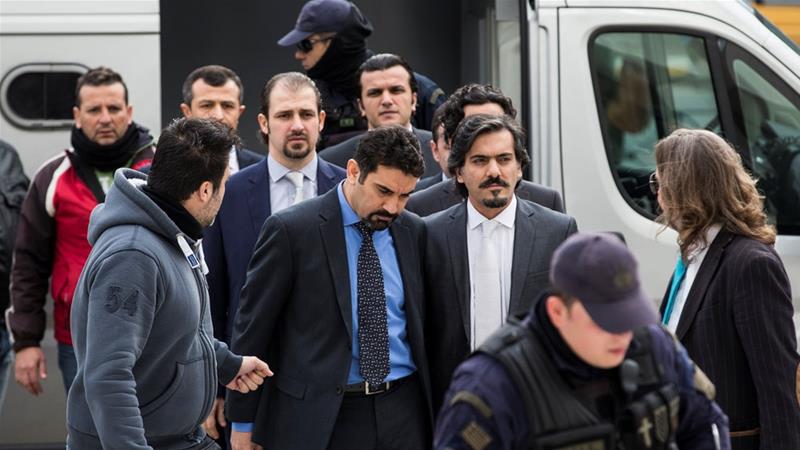On July 15th 2016, a coup d’état was attempted in Turkey. The coup was badly organized, as we learned later, with units believing they were headed to an anti-terrorism exercise (hence their deployment in urban centers). And it failed badly, with soldiers getting executed by an angry mob of President Erdogan supporters. In the wake of that, eight Turkish soldiers decided they did not want to stay and see what is going to happen to them. They took a military helicopter and headed for Greece. And Greece, despite its many faults, is a member of the European Union, and that means that if you come here as a persecuted man, your side of the story will be heard.
The soldiers – three majors, three captains and two sergeants major – said they came to Greece seeking asylum because they were in fear for their lives. Their hopes lied in the European law that states that a person can’t be extradited to a country where they are in danger of being killed or tortured. This law doesn’t allow extradition even to countries with perfectly working legal systems, so long as they have the death penalty in effect.
Today, the Supreme Court of Greece ruled against the extradition of the eight Turkish soldiers. The defender Christos Mylonopoulos stated after the ruling that, “It is a great victory for European values, for Greek justice. The legal thinking is obvious. It is the observation of European values, the observation of legality, and the conservation of judicial civilisation.”
The decision, to say the least, makes things quite interesting. Turkey did not take it lightly, and Erdogan himself has proclaimed the eight soldiers as traitors.
The Turkish foreign ministry posted the following statement on its website:
“Greece, an ally and a neighboring country, refrains from fulfilling the minimum requirements of combating terrorism and crime.” As a country that has experienced coups in the past, Greece, with this decision has regrettably put itself in a position of a country that provides shelter and protection to putschists.”
It also made thinly veiled threats considering the two countries’ bilateral relations:
“The implications on our bilateral relations, our cooperation against terrorism and other common cooperation in bilateral/multilateral matters of this decision, which we consider has been taken for political motives, will also be comprehensively evaluated.”
The funny thing is that the relations between Greece and Turkey were never that good to begin with. Even in the good old days of 1999, when two large earthquakes hit both countries and there was subsequent help sent from one country to the other, bringing the public of the two nations closer, the disputes about the Greek borders and the airspace violations by Turkey did not vanish.
As for the European Union, its relations with Turkey are also strained. The continuous stalemates of the refugee deal that was supposed to stem the flow of Syrian asylum seekers from the Turkish coasts to Greece and eventually the rest of Europe, the increasingly autocratic turns in President Erdogan’s rule of his country, and the alleged human rights violations, create a combustible mixture.
As for the eight soldiers themselves, as relieved as they may be with the court’s decision, their future is still far from guaranteed. As Greek defense editor Savvas Vlasis notes, “The failure of MIT (the Turkish intelligence) to warn Erdogan for the coup heightens the possibility for a dynamic operation against the eight. A possible spectacular operation would make up for their error in July. Also, it could be used by Erdogan to gain political support from nationalistic elements, ensuring the passing of his planned constitutional reforms, which would essentially turn him into a dictator.”
Already have an account? Sign In
Two ways to continue to read this article.
Subscribe
$1.99
every 4 weeks
- Unlimited access to all articles
- Support independent journalism
- Ad-free reading experience
Subscribe Now
Recurring Monthly. Cancel Anytime.
Let’s not forget that Turkish intelligence has somewhat of a tradition in kidnappings, as the famed Ocalan case proves. There, it clashed with Greek intelligence all the way to Kenya and eventually managed to snatch Ocalan.
Since summer there is an ongoing heated debate about what is the right course of action. One side claimed the respect for human rights, the other insisted on the fact that the soldiers were probably part of the coup plot. It is certain that the final ruling on the case from the Supreme Court will not put a stop to that debate.
The great question mark in all this remains the reaction of Turkey, which has many reasons to try to pull something out of a spy movie. That would be a gamble; it could fail and add to the embarrassment, or it could succeed and strain its international relations even further.
Image courtesy of Reuters










COMMENTS